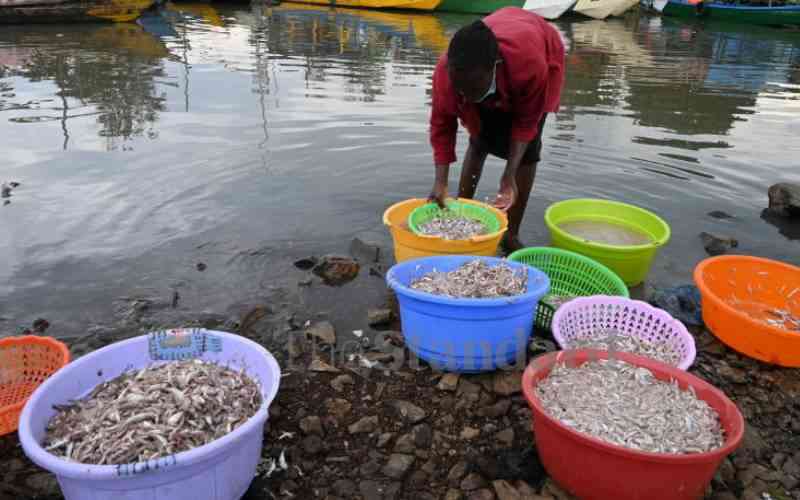
On the tranquil shores of Lake Victoria is Dunga Beach, a bustling fish processing and distribution hub.
Here, local fisherfolk reel in bountiful catches of tilapia, Nile perch, and mudfish, some of which are then processed for consumption and export by fishmongers and medium-sized fish processing facilities. With every fillet and fishcake produced, a looming environmental threat emerges in the form of tonnes of discarded solid and liquid fish remains.
The Kenya Marine and Fisheries Research Institute (Kemfri) reports that 150,000 tonnes of fish waste is generated each year. While some of the waste ends up in open landfills, a substantial portion is left to rot on the beach and is eventually swept into the lake, posing a serious risk to the delicate ecosystem and the livelihoods of those who depend on it.
Environmentalists on the shores of Lake Victoria have warned of the dangers of fish waste: when it decomposes, it consumes oxygen from the water. This can lead to oxygen depletion, which can harm fish and other aquatic organisms that require oxygen to survive.
In addition, excess amounts of fish waste and other nutrient sources can cause eutrophication in the lake. This is when an excess of nutrients in the water leads to algal blooms and reduced water clarity. Fish waste can also contain bacteria and viruses that can harm human health if the water is used for swimming, fishing, or other recreational activities.
Alice Aluoch, a fishmonger, reveals that before selling her fish, she removes the scales with a knife, resulting in up to a 20-litre bucket of waste each day.
At a fish market with hundreds of fishmongers, this results in tonnes of waste being discarded each day. Only a small bit is recycled.
Pollution aside, fishmongers are unaware that they are discarding potential sources of income by tossing out waste such as fish scales, bones, skin, and bladders. This waste could be worth millions of shillings on local and international markets, according to officials at the Kenya Fisheries Department.
Despite having a decade of experience in the fishing industry, Lucy Akinyi, a fishmonger says that she is ignorant of the concept of Omega 3 fatty acids commonly known as fish oil being produced from the wastes she discards.
This concept is behind an innovation by a group of interns at the Kenya Marine and Fisheries Research Institute. Young scientists are trying to solve the problem of fish waste by turning it into valuable fish oil.
Dennis Otieno, an aquatic science graduate from Egerton University, is leading four other interns with whom he has developed a method of repurposing fish scales into beautiful flowers for decorations at events and local universities.
While this solution is currently being implemented on a small scale, it has the potential to be scaled up using advanced technologies to address the environmental challenge posed by fish waste.
The programme was inspired by Otieno's undergraduate project in 2017, in which he extracted oil from the common carp (Cyprinus carpio) fish found in Lake Naivasha. Now, with the interns, the group uses Nile perch waste to extract fish oils.
Under the guidance of his supervisors, Otieno produced fish oil as part of his project to complete his undergraduate studies. When he graduated and joined the Kenya Fisheries Department as an intern, he collaborated with his colleagues to implement the project on the shores of Lake Victoria.
With a locally made oil extractor machine that costs Sh73,000, Otieno and his four colleagues extract Omega-3 fish oils from the offal (internal organs) of Nile perch.
The remains after the oil extraction process are used as chicken feed, gelatin, and collagen used to treat burns.
Otieno has showcased this innovation in different conferences such as the United Nations Environment Assembly (UNEA-5.2) held in Nairobi in March of last year to promote its sale to the public.
Dr Chrispin Nyamweya, the Assistant Director and Research Scientist at KMFRI, praised the innovation and revealed the organisation intends to seek the approval of agencies, including the Kenya Bureau of Standards (KEBS), that ensure safety for both flowers and fish oil before the technology is given to industries to implement.
He said KMFRI is taking time with the process to ensure the technology is patented and copyright is secured for the young innovators.
 The Standard Group Plc is a multi-media organization with investments in media
platforms spanning newspaper print
operations, television, radio broadcasting, digital and online services. The
Standard Group is recognized as a
leading multi-media house in Kenya with a key influence in matters of national
and international interest.
The Standard Group Plc is a multi-media organization with investments in media
platforms spanning newspaper print
operations, television, radio broadcasting, digital and online services. The
Standard Group is recognized as a
leading multi-media house in Kenya with a key influence in matters of national
and international interest.











